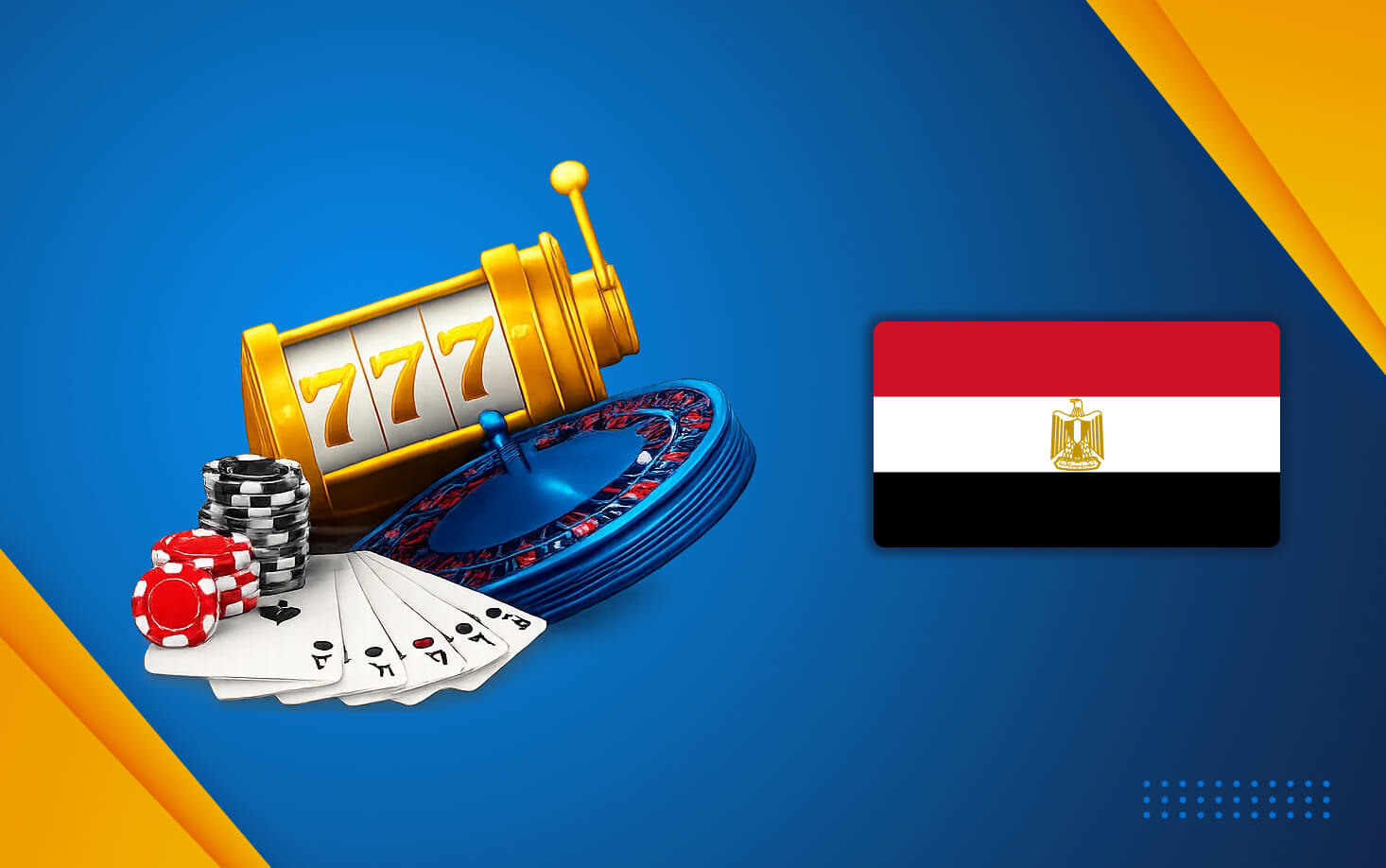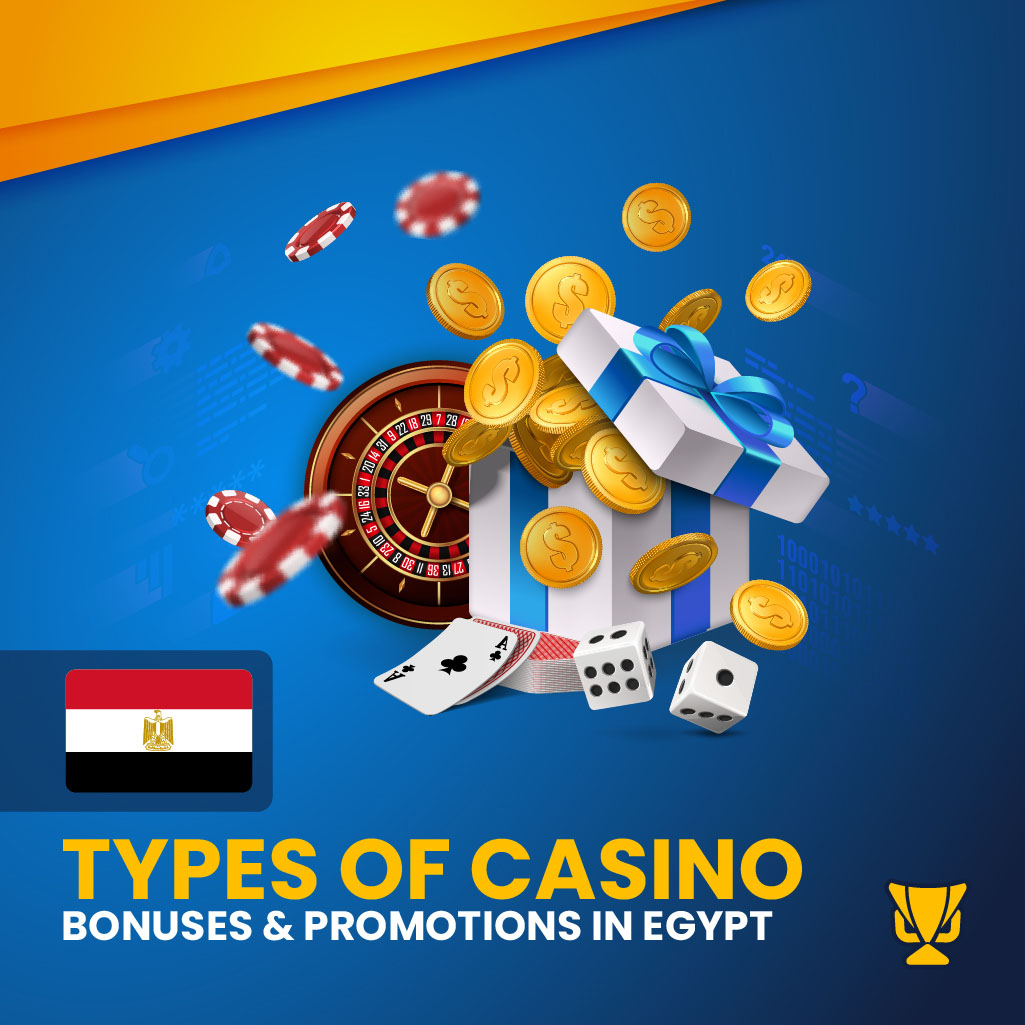Best Online Casino Egypt 2026
⏲️ Reading time: 24 minutes


Online casinos are rapidly gaining popularity in Egypt as a compelling alternative to traditional sports betting. These platforms provide convenience, accessibility, and a unique gaming experience.
This emerging trend reflects a broader global shift towards online gambling, driven by technological advancements. As players in Egypt increasingly embrace these virtual casinos, they discover a world of entertainment beyond conventional sports gambling.
| Rank | Casino | Rating | Bonus | Get bonus |
|---|---|---|---|---|
| 1 | 1xbet | 4.8/5 | Welcome package up to 81,000 EGP + 210 FS | Read review |
| 2 |  Megapari | 4.8/5 | 100% welcome bonus up to 9,750 EGP | Read review |
If you’re here to find the best online casinos in Egypt, you’ve come to the right place. But to further enrich your gaming experience, we’ll also present your range of options in terms of gaming, payment methods, apps, and more. Please refer to the links below to access the relevant content.

The history of casino gambling in Egypt is both ancient and dynamic, reflecting the cultural and legal shifts over millennia:
Gambling was a royal pastime originating in the times of pharaohs. Ancient Egyptians engaged in games like Senet, Hounds, and Jackals and bet on various events, infusing a cultural significance into gambling.
During this period, Islam's influence led to an official ban on gambling. However, the practice continued clandestinely, indicating its deep-rooted presence in Egyptian society.
The legalization and regulation of gambling marked a significant turn. Contemporary Egypt boasts several casinos in critical cities, offering a variety of games and entertainment. This reflects a growing acceptance and integration of gambling in modern leisure and tourism.
The advent of online real-money casinos gambling expanded Egypt's gambling landscape. While legal, the government's strict regulations, including the blocking of numerous sites in 2018, show an effort to control the sector and address challenges like illegal gambling and money laundering.
This evolution from ancient games to a regulated modern online free spins casino and offline industry highlights the enduring and adaptable nature of gambling in Egyptian culture and economy.
In our experience as expert evaluators of online casinos, we have seen varying opinions of what the best online gaming platform is. This is because of the various preferences on what characteristics it should have. So, let us introduce these top online casinos based on their respective strengths:
These gaming platforms aren’t just good in their respective categories. They’re all over all great casinos, having met our minimum requirements across all selection criteria.
Egyptian citizens, except those with dual citizenship, face restrictions in physical casinos, but many turn to international online platforms to use casinos in Egypt without verification. As this falls outside the scope of local laws. The Egyptian government must still establish a licensing or regulatory framework for online casinos.
Here's a table summarising the gambling landscape in Egypt:
| Aspect | Details in Egypt |
|---|---|
| 🌎 Country | Egypt |
| 👌 Language | Arabic |
| 💰 Currency | Egyptian Pound (EGP) |
| 🎰 Popular Casino Games | Slot machines, Blackjack, and Roulette |
| 📜 Is Gambling Legal? | Land-based: Yes (for tourists); Online: Unclear |
| ⚖️ Gambling Regulator | No specific online gambling regulator |
| ✅ Gambling Tax | Not explicitly defined for online gambling |
| 💳 Popular Payment Methods | Credit Cards, Bank Transfers, E-Wallets |
Are you ready to embark on a journey of chance and immerse yourself in the world of online casino gaming in Egypt? Look no further; here, we shall acquaint you with the top 5 online casinos available for Egyptian enthusiasts.

In Egypt's growing online casino sector, 1xBet is a prominent casino game platform. It presents an engaging online casino experience.
| Features | Descriptions |
|---|---|
| Welcome Bonus | Up to EGP 27,000 + 150 Free Spins |
| Popular Casino Games | Slots, Roulette, Blackjack, Baccarat, Poker |
| Suppliers | Microgaming, NetEnt, Playtech, Evolution Gaming, and more |
| Payment Methods | Visa, Mastercard, Bitcoin, E-wallets |
| Minimum Deposit | EGP 10 |
| Customer Support | 24/7 Live Chat, Email, Phone |

Megapari has significantly influenced the Egyptian casino market with its extensive selection of games, like slots, table games, and live dealer options. It features advanced technology and fluid gameplay.
| Features | Descriptions |
|---|---|
| Welcome Bonus | Up to EGP 50,000 + 150 Free Spins |
| Popular Casino Games | Slots, Roulette, Blackjack, Baccarat, Poker, Live Casino games |
| Suppliers | Microgaming, NetEnt, Playtech, Evolution Gaming, and more |
| Payment Methods | Visa, Mastercard, Bitcoin, E-wallets, Cryptocurrencies |
| Minimum Deposit | EGP 50 |
| Customer Support | 24/7 Live Chat, Email, Phone |

22Bet has garnered recognition in Egypt for its varied mix of slots and live casino games. Its straightforward interface and appealing bonuses have made it a popular option among Egyptian gambling fans.
| Features | Descriptions |
|---|---|
| Welcome Bonus | Up to EGP 5,000 + 22 Free Spins |
| Popular Casino Games | Slots, Roulette, Blackjack, Baccarat, Poker, Live Casino games |
| Suppliers | Microgaming, NetEnt, Playtech, Evolution Gaming, and more |
| Payment Methods | Visa, Mastercard, Bitcoin, E-wallets, Cryptocurrencies |
| Minimum Deposit | EGP 10 |
| Customer Support | 24/7 Live Chat, Email, Phone |

In the Egyptian online casino landscape, 20Bet stands out with various casino games. It's renowned for its intuitive interface and reliable customer support.
| Features | Descriptions |
|---|---|
| Welcome Bonus | Up to EGP 10,000 + 120 Free Spins |
| Popular Casino Games | Slots, Roulette, Blackjack, Baccarat, Poker, Live Casino games |
| Suppliers | Microgaming, NetEnt, Playtech, Evolution Gaming, and more |
| Payment Methods | Visa, Mastercard, Bitcoin, E-wallets, Cryptocurrencies |
| Minimum Deposit | EGP 50 |
| Customer Support | 24/7 Live Chat, Email, Phone |

1Bet has carved out a notable niche in Egypt's casino industry, presenting a robust selection of casino games. It adds value and an immersive gambling experience to its users.
| Features | Descriptions |
|---|---|
| Welcome Bonus | Up to EGP 3,000 + 30 Free Spins |
| Popular Casino Games | Slots, Roulette, Blackjack, Baccarat, Poker, Live Casino games |
| Suppliers | Microgaming, NetEnt, Playtech, Evolution Gaming, and more |
| Payment Methods | Visa, Mastercard, E-wallets |
| Minimum Deposit | EGP 50 |
| Customer Support | 24/7 Live Chat, Email, Phone |
In Egyptian casinos, it's essential to discern the finest options available. In this comparison, we'll meticulously evaluate the top casinos in Egypt, providing you with valuable insights to aid in your gaming choices.
Egyptian casino players nowadays suffer from information overload because there are so many online casinos popping up all the time! So, in our search for the top gaming platforms, we have formulated a systematic review process which takes into account various criteria, which we’ll talk about below:
Assuming that it was obtained from a respected gambling regulatory body like the Malta Gaming Authority or the Curacao Gaming Control Board, a license signifies that the casino is safe. The operator has gone through the arduous and financially demanding process of obtaining one. So, you can be sure not only that it has met all the quality standards but also that it’s not just going offline overnight.
Security is assessed based on the technologies used, such as SSL encryption and two-factor authentication. However, we also consider the policies they have in handling any data that you share. As for trustworthiness, we gather the experience of players who have used the platform. Then, we look for patterns to get a fuller picture of what it’s able to deliver.
At the best casino gaming platforms in Egypt, we require generous promotions, especially for those meant for new players. In assessing the quality of offers, we mainly look at the terms. For example, are the conditions for getting the bonus worth it compared to the potential rewards? More importantly, how quickly are you able to get your cash?
A quality online casino will have a range of gaming options, ensuring that regardless of whether you’re a newbie or an experienced player, you’ll find suitable titles for you. Here, we also look at the covered game subtypes. For example, what kind of slots are represented in the library? Our intent is to ensure that you can select options where you believe you have the biggest chance of winning.
There should be a lot of ways for a user to deposit and withdraw funds. This way, transfers will always be convenient and easy. For this factor, we also checked the transaction limits and compared them to those in other online casinos. Higher-than-average limits are preferred because they eliminate the need to make more than one transaction.
Being able to get help from the online casino is important, especially for new players who may be playing online for the first time. That’s why here, we checked the methods by which you can get information or help, the availability of each of them, and how quickly they can resolve your problems.
No matter what online casino you decide to go with, the journey towards placing your first bet is similar. Here’s what it looks like:
To speed up this step, just pick one of our recommended casinos! However, if you want to vet the options yourself, start by assessing them using the factors discussed in the previous section.
This procedure normally involves typing your details in a form. In this case, make sure all the details are correct, especially the email address. There’s usually a rule that there can only be one account per device and IP address. We recommend that you use the one-click signup feature if it’s available.
A quality online gambling platform will provide you with various ways to put some money into your casino account. Just pick one that works best for you. The actual process here will depend on what you choose. For example, crypto transfers require you to copy the casino’s wallet address and paste it into the wallet from which the funds will be sourced. Meanwhile, a debit card transfer entails entering your card details on a secure page.
To come as close to the advertised RTP for the game as possible, we recommend sticking with titles that you know how to play. However, feel free to explore and play whatever you want!
Online casinos allow people who would never have set foot in a physical casino to experience the joys of betting. However, they are not just an online interpretation of a land-based casino. They’re different in many ways, as you’ll see in our comparative table:
| Feature | Online Casinos | Land-Based Casinos |
|---|---|---|
| 🎰 Number of Games | In the thousands. From what we have seen, there are even online casinos that have more than 10,000 titles! The list keeps on growing because casino operators add new options all the time. | Based on the space. Although they can provide a decent variety of casino games, many can’t house the number of games that their online counterparts do. |
| 🎁 Promotions | Highly varied. The sky’s the limit when it comes to the kind of bonuses that you can get here. | Highly limited. They tend to go with loyalty offers because complex terms, such as those related to cashback, are hard to implement. |
| ✔️ Availability | Any device capable of opening a browser or app. As long as you have an internet connection, you can access the games. | Need to physically go to the location. This may not be convenient if the casino is not close to you. |

From deposit matches to loyalty programs, there are many ways to get rewarded in an online casino. Claiming generous deals is also very easy: just read and fulfill the terms of the promotion! Bonuses are normally credited automatically, so you can benefit from them right away. Come and see the most common promotional offers that you’ll find anywhere:
A welcome bonus is designed to tempt site visitors to create an account. The rewards that you can get are usually better than what you’ll see for other promotions on the same site. For example, one of our recommended casinos, MegaPari, offers the highest welcome reward at 50,000 EGP plus 200 free spins. To receive the bonus, you usually need to make a deposit. However, sometimes, even just creating an account makes you eligible for the reward.
The first deposit bonus is a common part of the welcome package. Here, your reward is based on your first money transfer. For example, if you transfer 1,000 EGP for the 100% first deposit bonus, you’ll get an additional 1,000 EGP in bonus funds. This is available right after signing up and may have an expiry date, which you’ll see in the promotion’s terms.
Free spins are different from other promotions because the wagering requirements are applied to the winnings instead of the bonus itself. And if you’re lucky enough to find a no-wager promotion, you’ll be able to withdraw it right away. Claiming this incentive is easy. Simply look for a casino that offers free spins, select a free spins offer (there are usually multiple options), and then click Get Bonus. For maximum benefit, consider the slot games on which you can use the reward.
Cashback is usually calculated in one of two ways: based on net losses or based on total wagers. You’ll see the first one practically everywhere. Usually, a minimum bonus amount is required, as well. Meanwhile, the second one is even rarer than no-deposit no-wager promotions. The only high-quality online casino that we have seen this on is 22Bet, where you get 0.25% of your total wagers once you reach the highest VIP status.
VIP programs are created to continuously reward and motivate existing players as well as high rollers. Most of the time, you get milestone rewards to celebrate the leveling up. However, there are also promotions associated with every VIP level, like exclusive personalized promotions, upgrades on regular bonuses, and even higher withdrawal limits.
Egypt's legal framework, particularly concerning gambling and internet use, is complex and multifaceted. Although there are general laws governing these activities, there is a significant gap in legislation specifically addressing online gambling.
Egyptian players interested in online gambling often turn to foreign online casinos. These online casino sites operate in a legal limbo within Egypt: they are not outright banned, recognized, or regulated by existing Egyptian laws.
This situation points to a broader context in which Egyptian Civil Law No. 131 (1948) operates. While this law encompasses a range of civil matters, its provisions do not directly address the rapidly evolving domain of internet-based activities, including online gambling.
As such, understanding this law's main provisions provides insight into Egypt's legal environment, especially in areas where traditional legal principles intersect with modern digital realities.
The Egyptian Civil Law No. 131 of 1948, specifically under Section 1 titled "Gambling and Betting," includes critical articles that regulate gambling contracts in Egypt. Article 739 of this law states that any agreement related to gambling or betting is considered void.
Additionally, it allows anyone who loses in gambling or betting to reclaim what they have paid within three years of the payment. They can prove such payment by all available means.
Article 740, on the other hand, provides exemptions for bets between persons personally participating in sports and legally authorized lotteries from the voiding provisions of Article 739.
Further, Article 24 of Law No. 8 of 2022, concerning Hotel and Tourism Entities, specifies that non-Egyptians may only play gambling games in designated facilities. This law mandates that the competent minister decide the conditions and controls for such gambling activities.
It also stipulates that the royalty from gambling activities should not exceed half of the revenues of new casinos in Egypt.
In Egypt, the gambling industry faces a rigorous taxation framework, especially for land-based 1 Egypt Pounds casinos. These establishments are levied with a substantial 50% tax on gross gaming revenue—a figure determined before subtracting operational expenses.
This revenue is then shared equally between the Ministry of Tourism and Finance.
In addition, casinos are responsible for a 20% income tax, import duties, and a significant 42% corporate tax on annual profits. This leads to a notable portion of casino earnings, roughly 60% to 70%, being channeled to the Egyptian government.
The Minister of Tourism and Antiquities oversees casino operations within the vibrant corridors of Egypt's hotels, introducing royalties limited to 50% of the gambling game revenues.
Contrastingly, the online casino landscape stands in stark difference, marked by the absence of a defined tax structure due to the lack of specific regulation. This regulatory gap signifies no standardized taxation for online gambling ventures.
In Egyptian online casinos, the availability of diverse payment methods is a critical factor for player engagement and satisfaction. This diversity is important because it caters to players with different payment preferences and needs.



Diverse payment options fulfill the requirements of various gateways, enhancing users' convenience and flexibility. They also facilitate entry into new markets by adhering to regional payment preferences and regulations.
Offering multiple payment methods can also increase transaction speeds, with options like e-wallets and crypto casinos enabling quicker deposits and withdrawals.
Moreover, each payment system or gateway might offer unique rewards, discounts, and perks, adding an extra layer of attraction for users. These methods range from traditional ones like debit and credit cards to modern digital solutions.
Let us now review each payment method and highlight the availability of minimum deposit casinos and instant withdrawal casinos in Egypt.
| Payment Options | Deposit Time | Withdrawal Time | Deposit Limits (E£) | Withdrawal Limits (E£) | Supported Casinos |
|---|---|---|---|---|---|
| Instant | 1-3 business days | 10 – 25,000 | 20 – 25,000 | CasinoFarouk, BC.Game Casino, Helabet Casino | |
| Instant | 1-3 business days | 20 – 5000 | 20 – 5000 | CasinoFarouk, BC.Game Casino, Helabet Casino | |
| 3-5 business days | 3-5 business days | No Limit | 20 – 25,000 | CasinoFarouk, BC.Game Casino, Helabet Casino | |
| Instant | 1-2 business days | 10 – 10000 | 20 – 10000 | CasinoFarouk |
Egypt's most popular casino games mirror global trends, focusing significantly on slot machines. These best new casino slots come in two main varieties: classic slots, which emulate traditional fruit machines, and video slots, known for their advanced features and animated graphics. Egyptian online casinos offer a wide range of both types, catering to diverse player preferences.
Blackjack is another favored game among Egyptian players, known for its high return-to-player rate. This high payout potential, theoretically more favorable over time than many other games, makes blackjack a preferred choice for strategic players. Players from Egypt can enjoy an amazing no-deposit bonus casino when they register on the platforms.
Roulette also enjoys popularity in Egypt. This classic casino game, evocative of the glamor of Las Vegas, is available in numerous variations on online platforms. These online versions either replicate the excitement of traditional roulette or offer innovative, technologically enhanced adaptations.
Slots are popular everywhere because of their engaging visuals and sound effects. Plus, they’re easy to play: get the reels spinning, be eligible for a payout based on the arrangement of resulting symbols, and then automatically get your winnings. Nowadays, you’ll see a lot of extra features on slots, such as wilds and scatters. There are also so many types of slot games, including the following:
Within each type, you’ll also see a lot of variations based on themes and game mechanics.
Blackjack is the game to play if you want to rely on your skills instead of luck. Assuming that you (quite literally) play your cards right, you have a high chance of winning. All you need to do is obtain a hand value that’s better than the dealer’s, or that’s worth 21. This basic rule prevails over all versions of the game, including Perfect Pairs and Spanish 21.
Card counting is a system where you add or subtract the count based on the cards dealt, then decide your move based on that. However, if you’d rather focus on the hand that you have right now, a good alternative is using an odds calculator.
Considered to be the Queen of Casino Games, roulette is highly popular because it allows for a balanced risk assumption. In this game, you can make many kinds of wagers, including red/black, odd/even, single bets, corners, streets, and more. The higher the potential payout, the higher the assumed risk is. Fortunately, you can mix and match these wagers to better suit your preferences. After betting, all you need to do is wait for the ball to land on one of the roulette slots and collect any due payout.
Many betting systems have been created to game roulette. D’Alembert, Martingale, and Labouchere are the most popular ones. All of these can be used in different roulette versions, such as Double Ball Roulette, which uses two balls instead of one, as well as Multi-Wheel Roulette, where there are as many as eight wheels.
Baccarat is a straightforward game that requires you to make a simple decision: bet on the banker or the player based on whose hand you believe will have a value closest to 9. This 19th-century game originated in France, and it has evolved into many variations. The most popular version is Punto Banco, where you automatically win if your first two cards have a value of 8 or 9. Another interesting version is Lightning Baccarat, which assigns a multiplier to random cards on the deck, thus increasing the potential payout.
Video poker is a lot like slots in the sense that the system automatically determines whether you’re due a payout. However, we still recommend getting familiar with various hand values, such as how straights are better than pairs, just so you can better appreciate the game. You start a round and are dealt five cards. Then, based on their value, you may receive a reward. The most popular version of this game is Jacks or Better, where you can only get a payout if you have at least a pair of Jacks. Another common version is Joker’s Wild, where a wild joker that can substitute for any other card is included in the deck.
Do you prefer betting using your phone or tablet? Then, you’ll be happy to know that literally every online casino nowadays can be accessed through a mobile browser. This is because they use HTML5 technology to create a smooth gaming experience. The remaining few that use flash technology are not accessible to mobile gamers.
However, what makes mobile casinos such a huge hit? Convenience is definitely a huge factor, especially since smartphones and fast internet connections are so affordable now. Some online casinos also offer mobile-exclusive promotions, which add to the appeal of having access to your favorite games right from your pocket.
Apart from the perks mentioned above, you can also enjoy one-tap access and quicker page loading by using a mobile app to play. Access all these advantages when you go with the best casino apps today:
Live casinos remove the line that separates online and physical casinos by allowing you to enjoy the best that both have to offer. Like with any online casino game, you’ll be able to access live games by just clicking or tapping on them. At some online casinos, you may even be able to bet using multiple currencies. Meanwhile, you’ll still be able to enjoy real-life interactions with the other players on the table and the live dealer. This amazing online-physical casino hybrid is made possible through the seamless integration of technology into the betting experience. Today, many game studios specialize in live casino games, the most popular of which is Evolution Gaming.
The online casino experience continues to evolve, further improving what players can get when they use these online gambling platforms. And even though more established casinos are capable of adopting innovation, you’re most likely to see the latest trends in new gaming platforms, like the following:
These are all reputable options that we have independently tested and verified. So, rest assured that you’ll be safe using any of them.
Navigating the Egyptian casino gaming scene presents a unique challenge. Unlike other regions where information about distinguished players and their gaming exploits is readily accessible, Egypt's casino culture remains more enigmatic.
This scarcity of data on the victories, losses, and overall contributions of Egyptian casino fans to the digital gaming community could stem from a myriad of factors:
Despite these information gaps, the achievements of Egypt's casino players are noteworthy. Over the past five years, Egyptian gamers have amassed winnings totaling $1,325,851 from 273 victories, averaging around $4,856 per win.
Among the luminaries of this scene, Fawaz A. stands out with a remarkable $55,269 win on Six Acrobats. At the same time, Rabaa H. has consistently demonstrated prowess with multiple substantial winnings, including $43,647 on Fantastic Four and $27,644 on The Incredible Hulk.
The gaming preferences of Egyptian players paint an interesting picture, too. Sports Bet leads as the most favored game, followed closely by Six Acrobats, Fantastic Four, and Thor. These games have not only captivated players but have also contributed significantly to their winnings.
The future of online casinos in Egypt shows promise despite some challenges. The Egyptian gambling market is expected to grow to US$2.11 billion by 2026, driven by increasing interest in online games and higher disposable incomes.
However, the government currently bans online gambling, limiting market growth. The regulatory environment, overseen by the Egyptian Gaming Board, is starting to recognize the potential of legalized online gambling.
Online casinos accepting players from Egypt operators are showing interest in the Egyptian market, and technological advancements, particularly in mobile gaming and security, are expected to play a significant role.
The cost and process of obtaining a gambling license are stringent, ensuring financial stability and technical capabilities. Despite current restrictions, the future of Egypt's online casino industry seems poised for growth and evolution.
Winning with any form of gambling is all about making informed decisions and minimizing the house edge. You want to do things right to improve your odds of winning! As a beginner, even these simple things can do a lot in giving you the biggest shot at a good payout:
It’s important to keep in mind that you can never be sure of winning at an online casino. Don’t bet some more in the hopes that you’ll regain your losses.
Gambling addiction is a significant concern in Egypt, impacting individuals, families, and society. This severe condition often leads to financial difficulties, job loss, strained relationships, and, in severe cases, even suicide.
Recognizing the need for support, organizations like Gamblers Anonymous Egypt offer essential help to those affected. Gamblers Anonymous is a global fellowship aiding individuals with a compulsive gambling problem.
The presence of Gamblers Anonymous varies worldwide. In some regions, it's well-established with numerous resources and meetings, whereas in others, its presence is minimal.
In Egypt, they provide a safe, supportive environment for sharing experiences and aiding recovery. Weekly meetings are available in Cairo and Alexandria, fostering a community where individuals can find solace and guidance.
GAMBLERS ANONYMOUS EGYPT
Cairo G.A. – "Hope"
When selecting an online casino in Egypt, prioritize casinos with proper licensing for security, a diverse range of high-quality games, and favorable terms and conditions. Consider the bonuses and best fast payout casino rates, and ensure the availability of convenient payment methods.
User-friendliness and reliable customer support are also vital factors. Tailor your choice to your gaming preferences, such as game variety, stake level, and mobile compatibility.
Online gambling is not regulated in Egypt—however, many people gamble on foreign betting websites and mobile casinos in Egypt. Land-based gambling is restricted to Egyptian citizens with dual citizenship and tourists.
The best online casino in Egypt allows players to gamble using mobile devices like smartphones and tablets, provided they have a stable internet connection.
Egyptian players favor table games like poker, baccarat, and blackjack. Slot games and live casinos in Egypt are also popular.
Egyptian players can claim welcome offers, free game casino spins, no-deposit, and cash back bonuses. They can also participate in tournaments and slot races and join loyalty programs.